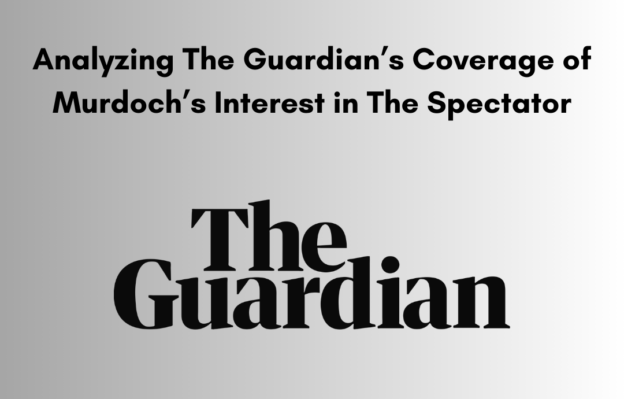Dive into Media Ownership, Ideological Disquiet, and Commercial Rivalries through Analysis of “Rupert Murdoch’s last move? The Spectator is in his sights” by Jim Waterson in The Guardian.
The Guardian’s reportage on Rupert Murdoch’s interest in acquiring The Spectator brings to light the intricate dynamics of media ownership, political ideologies, and their impact on public discourse. The first analysis delves into a précis and critique of the article from The Guardian, providing insights into the factual and subjective elements portrayed in the narrative. The second analysis presents a speculative argument concerning The Guardian’s apprehension towards Murdoch’s potential acquisition of The Spectator, highlighting the ideological, commercial, and historical facets that underlie this purported concern.
Precis
The article delves into Rupert Murdoch’s potential acquisition of the Spectator magazine post his resignation as chair of his media businesses, highlighting the implications it may have on the UK’s rightwing politics and media landscape. With various bidders eyeing the Spectator and the Telegraph, amid their influence on the Conservative party, the article also explores the ensuing change in editorial direction and rivalry among rightwing media moguls.
Critical Analysis
Strengths/True/Objective
- Financial Analysis: The article provides factual financial data regarding the Spectator’s valuation and its financial health, giving the reader a realistic perspective on the financial stakes involved.
- Diverse Opinions: The article encompasses a range of perspectives from different stakeholders, ensuring a holistic view of the potential deal and its implications on various entities including Andrew Neil and Fraser Nelson.
- Background Context: It provides a substantial historical and political context regarding Rupert Murdoch’s influence and the significance of the Spectator in the UK’s rightwing political sphere.
Weaknesses/Untrue/Subjective
- Speculative Tone: There’s a speculative tone regarding Murdoch’s intentions and the potential fallout of the acquisition which could reflect biases or assumptions rather than hard evidence.
- Insufficient Counterarguments: The article could be criticized for not offering enough counterarguments or alternative viewpoints to balance the narrative concerning the impact of the acquisition.
- Potential Bias: Being a publication that emphasizes its independence from billionaire ownership, The Guardian might carry a bias against media moguls like Murdoch, which could subtly influence the framing of the article.
Recommendations
- Diversifying Sources: Engaging more diverse sources and including more voices from different political or ideological spectrums could enhance the objectivity and thoroughness of the analysis.
- Clearer Separation of Facts and Opinions: Ensuring a clear delineation between factual reporting and opinion or speculative statements can enhance credibility.
- Further Analysis: A deeper analysis of regulatory hurdles and potential changes in the editorial direction of the Spectator could provide a more nuanced understanding of the situation.
Situation Improvement
- Transparency in Ownership: Transparency in the ownership and financial dealings of media outlets can contribute to better public trust and understanding of potential biases in reporting.
- Editorial Independence: Upholding editorial independence and diverse representation in media ownership can contribute to a more balanced and representative media landscape.
- Regulatory Scrutiny: Ensuring stringent regulatory scrutiny on media acquisitions can help maintain a pluralistic and competitive media environment.
The article sheds light on a significant potential change in the UK’s media landscape through Murdoch’s prospective acquisition, although it could benefit from a more balanced presentation of viewpoints and a clearer separation of facts from speculation.
Media Bias
The argument can be made that The Guardian, which generally leans towards the left on the political spectrum, may exhibit concern or apprehension towards Rupert Murdoch’s potential acquisition of The Spectator due to several factors:
- Increased Competition
- Murdoch’s history of transforming media outlets into influential platforms may intensify competition. His potential ownership of The Spectator could see it become a more potent force in UK media, thereby challenging the readership and influence of The Guardian.
- Ideological Conflict:
- The ideological disparities between Murdoch’s typical media undertakings and The Guardian’s left-leaning stance may underpin fears of a reinforced right-wing narrative in the public domain. This could potentially undermine the ideological agenda The Guardian pursues.
- Historical Antagonism:
- The historically adversarial relationship between Murdoch’s media empire and The Guardian, especially in light of instances such as the phone-hacking scandal, may contribute to apprehensions around his further consolidation of media power.
- Impact on Political Discourse:
- The Spectator, under Murdoch’s control, could become a stronger mouthpiece for right-wing ideologies, thereby swaying political discourse and policy in a direction opposing The Guardian’s values and stance. This scenario may also impact the political parties and candidates The Guardian supports.
- Media Pluralism:
- The Guardian often champions the cause of media pluralism and may view Murdoch’s expansion as a threat to diversified ownership in the UK media landscape. The consolidation of media outlets under a single proprietor, especially one with a strong political bias, might be seen as detrimental to a balanced public discourse.
- Commercial Concerns:
- From a commercial perspective, Murdoch’s ownership might attract a segment of advertising revenue towards The Spectator due to its potential increased readership and influence. This could, in turn, affect the financial standing of competing outlets like The Guardian.
These factors collectively and individually could be argued as reasons why The Guardian might feel threatened by Murdoch’s prospective takeover of The Spectator, encompassing both ideological and commercial dimensions..
Conclusion
Both analyses underscore the complex interplay of media ownership and ideological leanings within the UK’s media landscape. The Guardian’s narrative not only reflects on Rupert Murdoch’s continual influence in media circles but also hints at broader concerns regarding media pluralism, ideological balance, and commercial competition. Furthermore, the speculated apprehension of The Guardian towards Murdoch’s potential acquisition illuminates the deep-rooted ideological battles that define the UK’s media industry. This scenario underscores the imperative for a diverse media landscape to foster balanced public discourse and sustain a thriving democracy. Through these lenses, the situation encapsulates the ongoing challenges and the dynamic nature of media ownership in shaping political and social narratives.
